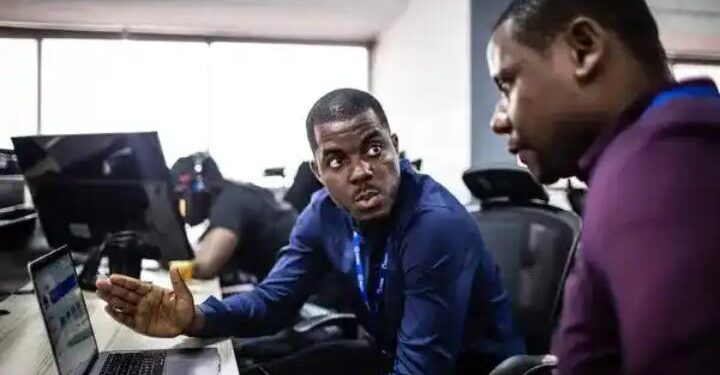The news:
Data Lead Africa, Abuja has announced a 3-day training exercise to teach Microsoft Excel to people with Hearing disability. It is the first program of its kind by the company with a vision to expand as time progresses into other areas of tech such as Data analysis, Data engineering, Visualization, etc.
Why it matters:
Although the global workspace has mirrored a growing commitment to empowering women and to facilitate their inclusion in the workspace, they have seemed to neglect the fact that women are not the only underrepresented group in the economy and that the Diversity Equity Inclusivity (DEI) campaign covers more than just gender inclusion.
Did you know?
There are over 1 billion people living with disability worldwide and 80% of these people live in developing countries with low or middle income rates.
Not just these but, almost everyone, according to the World Health Organization, is likely to experience some form of disability—temporarily or permanently—at some point in life. This is due to factors such as age, malnutrition, poverty, war/conflict, natural disasters/accidents, among other causes.
According to reports by the World Bank, “the employment rates of persons with disabilities are substantially lower than the rates for persons without disabilities. Consequently, persons with disabilities have lower earnings, and are most likely to be in low-skilled, part-time, and informal job settings with subminimum wages. They also face challenges in their access to finance, markets, and networks because of barriers that arise out of noninclusive regulations, policy and resource allocation, social stigma and prejudice, low educational participation, and obstacles to moving around their own communities and city spaces”.
Disability in Nigeria
In Nigeria alone, as at 2020, an estimated 27 million Nigerians were recorded to be living with some form of disability. Ranging from visual impairment, hearing impairment, physical impairment, intellectual impairment down to communication impairment.
After 18 years of negligence at the National Assembly, President Muhammadu Buhari—in January, 2019—signed the Discrimination against Persons with Disabilities (Prohibition) Act into law. An Act which was to prohibit and punish all forms of discrimination against persons with disability, protect their already existing rights and privileges as humans and citizens of Nigeria and to provide them with new privileges that will see to their development.
But a lot of these development plans targeted at the physically challenged are tools and ideas to feed, shelter and medically assist them; and although these ideas are well-meant, they fail to truly recognize that these individuals are also capable of evoking change and giving back to society.
A popular African saying says to teach how to fish rather than feed others with fishes. In this context, what this simply means is that, the society needs to start trusting and training their underprivileged members rather than teaching them to depend on a system that may not always be capable of meeting all of their needs.
Tech and Disability in Nigeria
Technology has played an outstanding role in the improvement of human standard of living. For disabled persons, it has played an even bigger role with assistive technology like voice recognition technology, text/braille-to-speech, artificial limbs, wheelchairs, etc. These technologies have helped narrow the gap between people living with disability and those without disability. But, in the tech workforce, there is still a massive underrepresentation of persons with disability, especially in Nigeria.
In an interview with CrestHub, Sandra Mahanna, a web developer, data analyst and a key member of the teams leading the training program at Data Lead Africa, Abuja, affirms that there is a need for more employers to think of inclusivity when hiring.
Mahanna said, “The economic gap keeps widening due to people’s insensitivity towards the disabled and if the world is going tech, we have to do more on inclusion, if not, in the near future, people living with disabilities will form the bulk of tech illiterates. Persons living with Disabilities have more to offer than you would think, so more humanitarian aid, more tech related establishments need to rise to this call and see how they can come in”.
“The tech ecosystem is as competitive as it is wide. There are so many roles to fill and so many skills that don’t even require coding. It is all about finding your niche and area of interest. As long as you have the interest, there is a place for you in tech, no matter your ability”, she added. “The head of Data-Lead Africa, Dr. Ayoola Arowolo had been nursing this project for a long time. He has had a lot of experience interacting with people with disabilities, and is very passionate about inclusion. Weeks after I started at the firm, the project just came alive and here we are – about to host the first training”.
However, Data Lead Africa is not alone in the journey to bring more disabled Nigerians into tech. Both within and out the country, various groups and companies have made it a goal to advocate and facilitate the Inclusion of disabled persons in the tech ecosystem.
A good example is the Global Disability Innovation Hub (GDI Hub). Since 2016, the group has reached about 28 million people, scattered across over 40 countries including Nigeria. They work with about 70 other organizations to innovate, educate and fund ventures and persons living with disabilities as well as advocate for the Inclusion of disabled persons in the workforce. In 2021, they were the first official collaborating center for the World Health Organization (WHO) on assistive technology.
SupplierGATEWAY is another key player in the race for diversity, equity and inclusivity in the tech space. For years the company has provided the globally recognised Enhanced Digital Certification (EDC) that ensures that women and people with disabilities are also exposed to digital skills and employment.
Deaf Technology Foundation (DTF) is another group—based in Nigeria—whose mandate is to equip children with disabilities with digital skills from an early age.

































